KATHMANDU, Jan 22: President Donald Trump, who began his second term on Monday, announced the US withdrawal from the Paris Agreement. Amid a growing climate crisis demanding global unity, Trump’s announcement has sparked widespread international anger and worry.
The US withdrawal, announced through an executive order by the President, has brought the number of countries not part of the Paris Agreement to four. The three countries, Iran, Libya, and Yemen, haven’t signed the agreement. The Paris Agreement aims to limit global temperature increase to 1.5 degrees Celsius by the end of this century. The world's temperature has risen by 1.3 degrees, and disasters such as floods, fires, droughts, inundations, heavy rains, melting glaciers and other disasters are increasing due to climate change.
The US President’s decision has been strongly criticized by scientists, activists, and civil society leaders. Trump's desire to double the extraction and use of fossil fuels for energy is seen as moving the US away from the production of clean energy technologies such as solar and wind, and the US is set to withdraw from the leadership of global climate negotiations.
U.S. formally exits global climate pact amid election uncertain...

This decision by the US, which is the second largest emitter of carbon, has exposed the hollow commitment of rich countries to address climate change, says climate expert Dr Bimal Regmi.
"The US President's announcement to withdraw from the Paris Agreement has further exposed the responsibility and accountability of rich countries. This has further complicated the issue of climate justice for countries like Nepal," he says. Another climate change expert, Manjit Dhakal, says this is not the first time the US has withdrawn from the agreement.
Trump had made the same announcement during his previous term, in 2017. Since 2017, the climate crisis has deepened in the world, and during this period, the transition to green energy has gained great momentum and green jobs have increased significantly, according to Dhakal. “The ambitious climate action targets not only protect others but also the countries concerned from the climate crisis and ensure a sustainable future,” says Dhakal, who is also an expert advisor to the Minister of Environment and Forests.
Climate activist and founding director of the Sustainable Heritage Climate Foundation, Harjit Singh, considers President Trump’s move “a devastating blow not only to one country but to the entire planet.”
“There may be economic benefits from the use of fossil fuels domestically, but it is against the health and well-being of the American people,” he says. He argues that this move has set back collective efforts to solve the climate crisis against the backdrop of increasing tragic events due to climate change globally.
“Developing countries are more likely to be affected by the climate crisis. These countries, which contribute little to global emissions, are likely to be further exposed to the risks of climate change,” he says.
Even if the US president decides to withdraw from the agreement, it will take a year for the formal withdrawal process to be implemented. Since 2005, US carbon emissions have fallen by 20 percent. Despite strong economic growth during this period, the US has managed to reduce its carbon emissions. But to meet its climate goals, the US needs to reduce its current emissions by a factor of 10. According to a recent study by Climate Action Tracker, even if countries around the world meet their current emissions reduction commitments, the average global temperature will rise by 2.6 degrees Celsius by the end of this century.









_20201231131339.jfif)




























